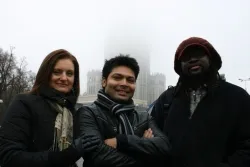Warsaw and the whole Poland have always been the place, where cultures met and coexisted. It is related to the character of Polish people, their history and the location of Poland. For a person, who comes from western Europe, Poland is already East with numerous influences of Byzantine and Asian cultures. For an inhabitant of Eastern Europe, it is Poland, where the West begins. People of various culture, religious beliefs and races have been migrating for ages to settle down in Poland. It was the WWII and the beginning of communism which stopped migration and made the society homogenize gradually. In my opinion there is no place in the world, where multiculturalism exists. By multiculturalism I understand coexistence of groups of different values, respecting one another. We could rather talk about people cultivating their cultural uniqueness in a country, where a different culture dominates. Poland is no different as here Roman Catholic tradition dominates.
So ‘multiculturalism’ meaning coexistence of different people from different cultures and traditions is a fixed element of Warsaw life.
In the capital of Poland one can meet immigrants from Africa, Asia, Middle East or South America. Many of them, including myself, have found here a place to live and make their dreams come true.
Poles and foreigners
Poles’ attitude towards foreigners is often related to the knowledge of Polish language. It is my experience that fluency in Polish eliminates barriers between Poles and foreigners. Thanks to the knowledge of the language, understanding of the Polish culture, sense of humor and Polish complexes, I deserved acceptance and respect. The fact that I come from a different culture, but I speak Polish fluently, gave me a lot of positive experience in relations with people.
Poles are extremely frank, which is of course against any rules of ‘political correctness’. I agree with one of Africans living in Poland, who said that in France, where he migrated from Africa, nobody had ever shouted bad words at him, but also nobody had ever invited him home. He added that it was understanding of the Polish mentality, which helped him become one of Poles. He is invited by his friends to different parties and celebrations, which had never happened when he lived in Western Europe.
It is similar with the Vietnamese minority living in Warsaw. As long as they speak Polish, they have no problem with assimilation, and their origin does not impact relations with the Polish people.
I think that Poland may become a new home for numerous immigrants as long as we, foreigners, do our best to learn the language, culture and tradition of the Polish people.
Text by Thu Ha Mai
Translated by Anna Trybuch








